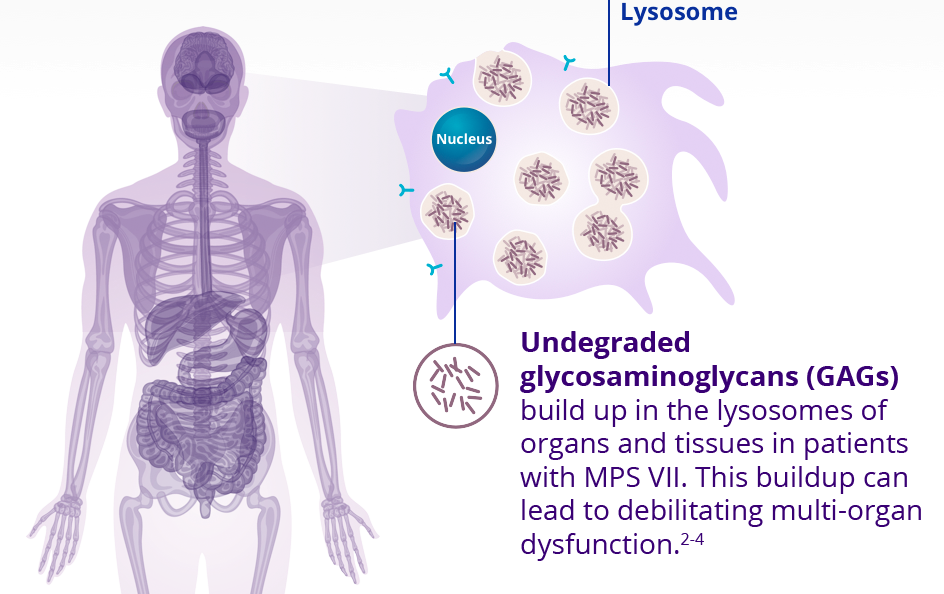

Recommend genetic counseling services to help the parents understand the complexity surrounding the carrier state and inheritance of this disease.Follow-up with the child’s metabolic disease specialist.These guidelines should be followed after a diagnosis of MPS I disease has been confirmed: Follow-up After Confirmation of Diagnosis If the child needs additional testing or diagnostic evaluation, make certain the parents understand the importance of following the pediatrician’s and/or specialist’s recommendations for additional testing and referrals. If the infant should turn out to have MPS I, therapy is available that may ameliorate the clinical symptoms of the disorder. Reassure parents not all infants identified as having low alpha-L-iduronidase activity through newborn screening will have MPS I.

The build-up of GAGs in the lysosomes causes clinical findings of the disease. In MPS I disease, the lack of alpha-L-iduronidase enzyme activity leads to an abnormal accumulation of glycosaminoglycans (GAGs). Genetic counseling is recommended for families planning future pregnancies. All siblings of infants diagnosed with MPS I should receive medical evaluation and/or testing for MPS I and genetic counseling services should be offered to the family. These risks hold true for each pregnancy. Carrier parents have a 50 percent chance of having a child who is an unaffected carrier and a 25 percent chance of having an unaffected, non-carrier child. With each pregnancy, carrier parents have a 25 percent chance of having a child with two copies of the abnormal gene resulting in MPS I. Since MPS I disease is an autosomal recessive disorder, the parents of a child with MPS I are unaffected, healthy carriers of the condition and have one normal gene and one abnormal gene. The incidence of MPS I disease is estimated to be about 1 in 100,000 and it affects males and females equally. Developmental, occupational and physical therapy are often necessary.
/503689904-56d4b27d3df78cfb37d8b46e.jpg)
Other treatments depend on the involved organs. Bone marrow transplant is another available treatment for severe MPS I patients. Enzyme replacement therapy is now available for MPS I to help relieve symptoms but it is not a cure. Care is directed towards relieving the symptoms and is not typically instituted until clinical symptoms appear or a severe form of the disease is determined by genotype. Once clinical findings appear, treatment of MPS I disease is multi-disciplinary and is best treated by a team of specialists knowledgeable about the disease who can offer supportive and symptomatic care. If newborn screening results indicate abnormal activity of this enzyme, referral should be made to a metabolic disease specialist.

In Illinois, newborn screening for MPS I disease is performed by measuring alpha-L-iduronidase enzyme activity. Newborn Screening and Definitive Diagnosis Children with MPS I H-S and MPS I S may have normal intelligence with milder symptoms starting later in childhood. The other subtypes of MPS I are MPS I H-S (Hurler-Scheie syndrome) and MPS I S (Scheie syndrome). Symptoms of MPS I may include mental retardation and developmental delays, short stature, stiff joints, speech and hearing impairment, heart and lung disease, enlarged liver and spleen, hernia, coarse facial features, hydrocephalus, spinal compression, pain and a shortened life span. The severe form, MPS I H, also known as Hurler syndrome, has more severe symptoms that usually start within the first year of life. MPS I is a multisystem disorder and presents in three types with a wide range of symptoms. Lysosomal accumulation of these GAG molecules results in cell, tissue and organ dysfunction. This enzyme is responsible for the breakdown of certain glycosaminoglycans (GAGs). MPS I disease, also frequently referred to as Hurler syndrome, is an inherited, autosomal recessive lysosomal storage disorder caused by deficiency in the activity of the enzyme alpha-L-iduronidase. Mucopolysaccharidosis Type I (MPS I) Disease (Hurler, Hurler-Scheie and Scheie Syndromes) Information for Physicians and Other Health Care Professionals Definition Mucopolysaccharidosis Type I (MPS I) Disease


 0 kommentar(er)
0 kommentar(er)
